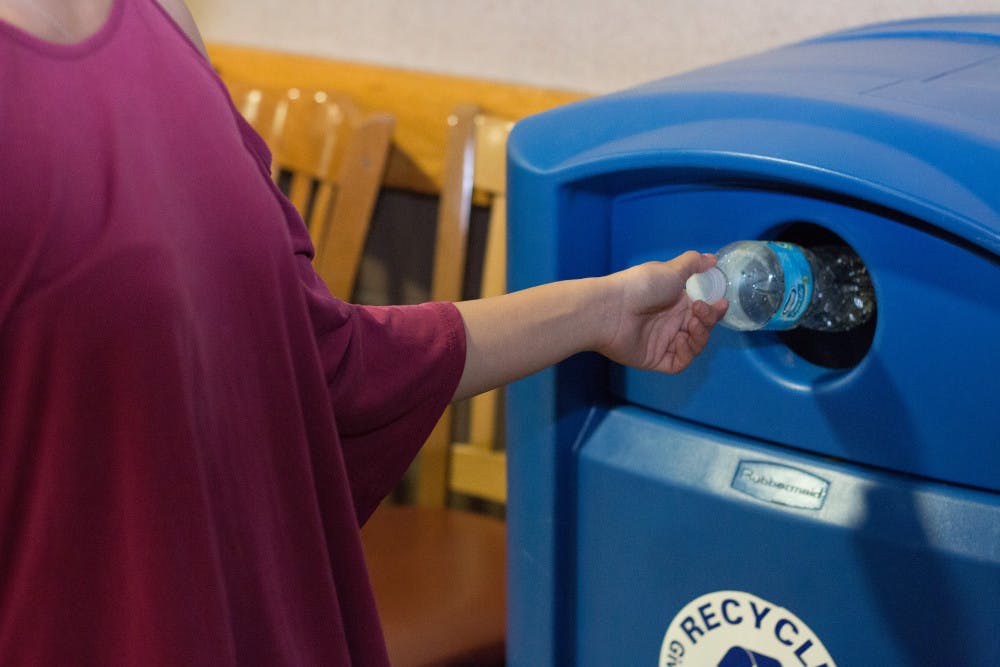On average about half a ton of recyclable materials and 100 tons of waste are hauled off campus every month, according to a school-wide business affairs email. But for the environmentally conscious, out of sight does not necessarily mean out of mind.
“The less we put in landfills, the more we repurpose, the better it is for the world,” environmental studies professor, Wanda Knapik said. “But before recycling we should think more about refusing plastic.”
[caption id="attachment_19745" align="aligncenter" width="838"] Seton Hall has participated in Single-Stream recycling since 2012. Sarah Yenesel/Assistant Photography Editor.[/caption]
Knapik said that by refusing to use materials such as plastic and styrofoam, people can prevent them from being a problem.
“There’s plastic in all of our water now and there’s plastic in all of the food we eat because the animals are ingesting plastic,” Knapik said. “Plastic is in our water systems and is therefore in our bodies at a nano level. We’re eating and drinking and ingesting plastic all the time, that’s the environmental fact. So you think that you can’t make a difference but you can by not purchasing a plastic container of water of all things.”
To do her part, freshman elementary education major, Sarah Hollcraft, periodically refills her favorite blue water bottle at various fountains on campus and stores food in reusable Tupperware containers. She developed her own recycling routine after taking an environmental science course in high school.
“We talked a lot about waste and we even did a lab where we had to carry our waste around in a bag for a week,” Hollcraft said. “I realized how much I was using and wanted to lessen it. So I got into the habit of just not using plastic water bottles, not using Ziploc bags as much, reusing paper towels if I can, anything that will save waste.”
Business affairs support specialist, Alysha Croswell, says SHU continuously works to improve recycling efforts and sent out an email earlier this month to remind people about campus recycling guidelines.
SHU has participated in Single-Stream recycling since it was instituted in South Orange in 2012, according to Croswell. Single-Stream recycling means that recyclable materials such as paper, plastic, metal and glass are hauled away together from the same bin. If a recyclable container is contaminated with trash, the bin can no longer be recycled.
“The recycling facility does not sort trash, therefore cannot accept trash,” Croswell wrote in an email. “Sorting does not take place on campus, so if a bin is seen to be contaminated, it cannot be taken to the recycling facility.”
It is unknown to business affairs how many bins get contaminated, but it does happen. Hollcraft suggests that there should be more trash and recycling cans on campus.
“There’s a lounge in Aquinas where there’s just a recycle bin and instead of going out to look for a trash can, I see some people using the recycling as trash,” Hollcraft wrote.
Additionally, Knapik says that any amount of recycling is a good amount but there is always room for improvement.
“The fact that we have recycling cans, the fact that we do recycle is all good,” Knapik said. “There’s many institutions that don’t recycle at all, so we’re on a better path than most. It’s up to every single person on this campus to be using less plastic and recycling it.”
Emily Pemble can be reached at emily.pemble@student.shu.edu
Seton Hall has participated in Single-Stream recycling since 2012. Sarah Yenesel/Assistant Photography Editor.[/caption]
Knapik said that by refusing to use materials such as plastic and styrofoam, people can prevent them from being a problem.
“There’s plastic in all of our water now and there’s plastic in all of the food we eat because the animals are ingesting plastic,” Knapik said. “Plastic is in our water systems and is therefore in our bodies at a nano level. We’re eating and drinking and ingesting plastic all the time, that’s the environmental fact. So you think that you can’t make a difference but you can by not purchasing a plastic container of water of all things.”
To do her part, freshman elementary education major, Sarah Hollcraft, periodically refills her favorite blue water bottle at various fountains on campus and stores food in reusable Tupperware containers. She developed her own recycling routine after taking an environmental science course in high school.
“We talked a lot about waste and we even did a lab where we had to carry our waste around in a bag for a week,” Hollcraft said. “I realized how much I was using and wanted to lessen it. So I got into the habit of just not using plastic water bottles, not using Ziploc bags as much, reusing paper towels if I can, anything that will save waste.”
Business affairs support specialist, Alysha Croswell, says SHU continuously works to improve recycling efforts and sent out an email earlier this month to remind people about campus recycling guidelines.
SHU has participated in Single-Stream recycling since it was instituted in South Orange in 2012, according to Croswell. Single-Stream recycling means that recyclable materials such as paper, plastic, metal and glass are hauled away together from the same bin. If a recyclable container is contaminated with trash, the bin can no longer be recycled.
“The recycling facility does not sort trash, therefore cannot accept trash,” Croswell wrote in an email. “Sorting does not take place on campus, so if a bin is seen to be contaminated, it cannot be taken to the recycling facility.”
It is unknown to business affairs how many bins get contaminated, but it does happen. Hollcraft suggests that there should be more trash and recycling cans on campus.
“There’s a lounge in Aquinas where there’s just a recycle bin and instead of going out to look for a trash can, I see some people using the recycling as trash,” Hollcraft wrote.
Additionally, Knapik says that any amount of recycling is a good amount but there is always room for improvement.
“The fact that we have recycling cans, the fact that we do recycle is all good,” Knapik said. “There’s many institutions that don’t recycle at all, so we’re on a better path than most. It’s up to every single person on this campus to be using less plastic and recycling it.”
Emily Pemble can be reached at emily.pemble@student.shu.edu





